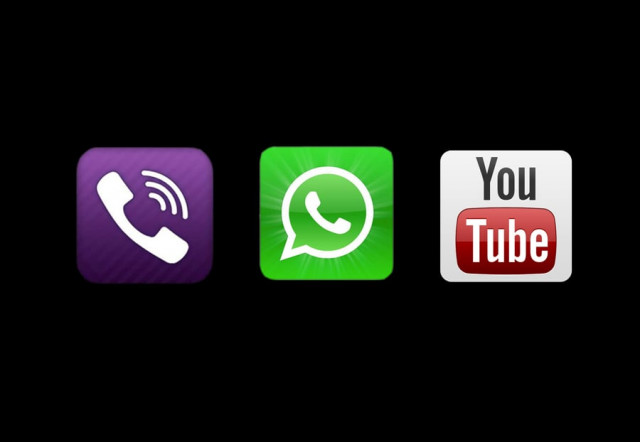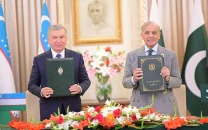Advanced mobile services: Country has to tread a tricky path
Experts suggest government must learn from mistakes made by regional peers.

Highspeed internet can yield returns only when data services – like Whatsapp, Viber, Youtube to name a few – remain active. PHOTO: FILE
Following the government’s recent progress towards auction of next-generation mobile spectrum licences, the country is once again looking for high-speed mobile broadband services. But conducting a successful auction will certainly be a challenge for the government.
Pakistan Telecommunication Authority (PTA), the telecom sector’s regulatory body and the agency responsible for conducting the auction, had achieved a phenomenal success in spectrum auction in 2004 when it sold 2G licences, one each to Telenor Pakistan and Warid Telecom. It was able to sell a 2G licence for $291 million, more than double the $140 million it had expected to fetch.

The telecom regulator is once again tasked with conducting a spectrum auction, though under different circumstances this time.
After remaining dysfunctional for more than a year, PTA finally looks set to revive its reputation as an independent regulator. However, the success of the auction will be a challenge for multiple reasons, ranging from strategy for spectrum auction to market forces and regulatory environment.
“Conducting a successful [spectrum] auction will be a challenge, of course,” said Parvez Iftikhar, former CEO of Universal Services Fund and an information and communication technology consultant. “Even Canada didn’t attract outside investors in its [spectrum] auction,” he said.
Similarly, India and Bangladesh – the two regional countries with 3G services – made some mistakes in their spectrum auctions and Pakistan can learn from them, experts say.

Last month, Bangladesh raised $525 million by selling 25 megahertz (MHz) of 3G spectrum to four telecom operators. Given the base price for 10 MHz was $200 million, Bangladesh could take it only $10 million above the base price.
This happened because the number of bidders and licences put on auction were the same, thus killing competition. Additionally, it divided the spectrum into small chunks of 5 MHz, which is not suitable for 3G.
India, on the other hand, raised $14.6 billion through 3G auction in May 2010, which was almost double the amount they had expected. However, experts say, it set the initial price too high that the operators were hardly left and with any money to invest in network expansion. India’s 3G penetration is around 7%.
“The government shouldn’t only focus on short-term gains by setting a very high price,” Iftikhar said. “Instead, it should impose stringent conditions for an early and nationwide rollout of the technology,” he said.
The base price for upcoming auction has to be evaluated by the consultants, who are yet to be hired, but as per old Information Memorandum, the base price for a single licence for 3G spectrum was $210 million.

In the absence of a wholesome strategy, Pakistan can face a similar situation that affected Bangladesh’s 3G auction.
With a possible acquisition of Warid Telecom, most likely in the week after Eidul Azha, there will be four potential bidders, experts believe. It is perhaps for this reason the government is likely to go for three blocks of 10 MHz each in the proposed 30 MHz spectrum to keep the competition alive, they say.
Besides the auction strategy, the government has to improve the regulatory environment as well. High-speed internet can yield returns only when data services – like Whatsapp, Viber, Youtube to name a few – remain active. By contrast, Youtube is already banned in the country while the Sindh government has called for a ban on Whatsapp and Viber.
Moreover, Federal Information Minister Pervaiz Rashid’s recent statement about unverified SIMs may further dent investors’ confidence in the regulator ahead of the bidding.
Rashid, according to media reports, proposed that the CEO of the telecom firm whose unverified SIM is used in any terrorist activity could be apprehended.
“Such kind of regulatory directives certainly hurt investors’ sentiments but we are in talks with both the federal and provincial governments to improve the regulatory environment,” said a government official who asked not to be named.
Talking about what the government can learn from the mistakes of Bangladesh and India, the official said, “we should not divide the spectrum into very small chunks and the initial cost should not be too high.”

Admitting things have not evolved as expected, Iftikhar, the ICT consultant, insisted the country still has a better regulatory regime than regional peers. It is Pakistan’s independent regulatory regime that can attract investment, he said.
“We have the best regulatory regime in the region,” Iftikhar said. Explaining, he said legislation, regulation and operation are all separated, which is considered an ideal model.
Published in The Express Tribune, October 14th, 2013.
Like Business on Facebook, follow @TribuneBiz on Twitter to stay informed and join in the conversation.



















COMMENTS
Comments are moderated and generally will be posted if they are on-topic and not abusive.
For more information, please see our Comments FAQ